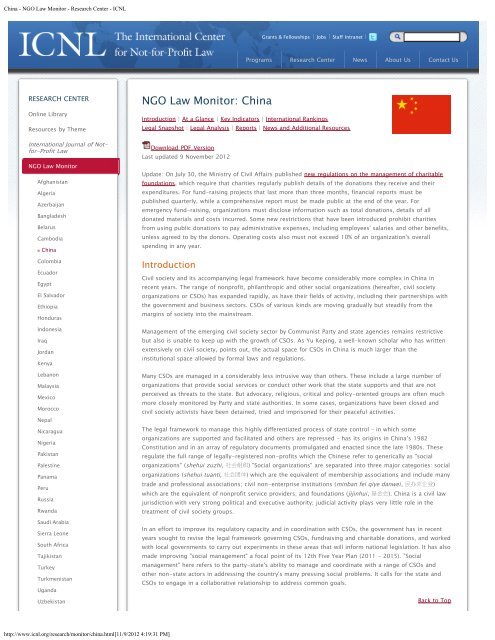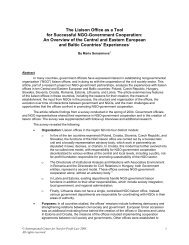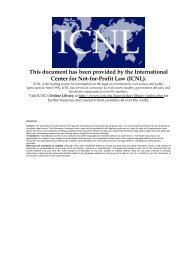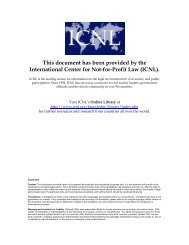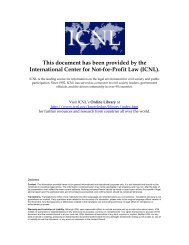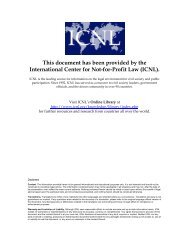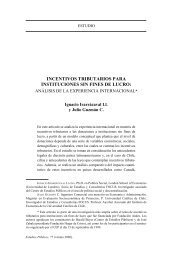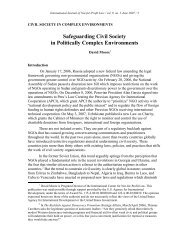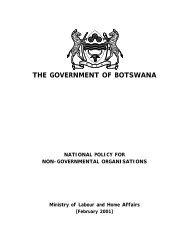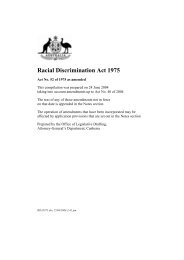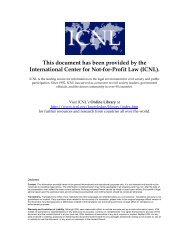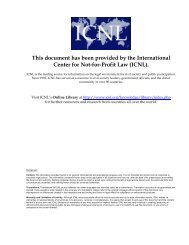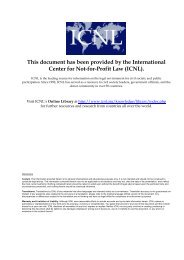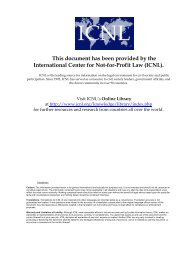NGO Law Monitor: China RESEARCH CENTER - The International ...
NGO Law Monitor: China RESEARCH CENTER - The International ...
NGO Law Monitor: China RESEARCH CENTER - The International ...
You also want an ePaper? Increase the reach of your titles
YUMPU automatically turns print PDFs into web optimized ePapers that Google loves.
<strong>China</strong> - <strong>NGO</strong> <strong>Law</strong> <strong>Monitor</strong> - Research Center - ICNL<br />
Venezuela<br />
Yemen<br />
Zimbabwe<br />
African Union<br />
Association of Southeast<br />
Asian Nations<br />
Council of Europe<br />
League of Arab States<br />
Organization of American<br />
States<br />
Organization of the Islamic<br />
Cooperation<br />
Organization for Security<br />
and Cooperation in Europe<br />
United Nations Human<br />
Rights Council<br />
Global Trends in <strong>NGO</strong> <strong>Law</strong><br />
At a Glance<br />
http://www.icnl.org/research/monitor/china.html[11/9/2012 4:19:31 PM]<br />
Organizational Forms<br />
Registration Body Ministry of Civil Affairs<br />
Barriers to Entry<br />
Barriers to Activities<br />
Barriers to Speech<br />
and/or Advocacy<br />
Barriers to <strong>International</strong><br />
Contact<br />
Barriers to Resources<br />
Key Indicators<br />
Social organizations (shehui tuanti), civil non-enterprise institutions (minban<br />
fei qiye danwei), and foundations (jijinhui). <strong>The</strong> last category includes two<br />
types of foundations: public fundraising and non-public fundraising<br />
foundations.<br />
1. System of “dual registration” for all social organizations;<br />
2. Extensive documentation requirements;<br />
3. Broad prohibitions in certain activities and areas such as advocacy, legal<br />
assistance, labor, religion, and ethnic minority affairs;<br />
4. Extensive discretion to deny registration;<br />
1. Government discretion to limit establishment of more than one<br />
organization in activity area;<br />
2. Government discretion to intervene in internal affairs;<br />
3. Burdensome reporting requirements;<br />
Population 1,336,718,015 (2011 est.)<br />
Capital Beijing<br />
Type of Government Communist State<br />
Life Expectancy at Birth<br />
Literacy Rate<br />
Religious Groups<br />
Ethnic Groups<br />
4. Invasive government monitoring and inspections.<br />
<strong>The</strong> Government has discretion to limit speech and advocacy for specific<br />
organizations and types of organizations and for specific cases that might be<br />
seen to negatively impact national security.<br />
Organizations are sometimes required to report international contacts to<br />
authorities and sometimes to seek approval for visits, international<br />
cooperation, foreign donations, etc. <strong>The</strong>y are also discouraged from working<br />
with or receiving funding from overseas organizations which are engaged in<br />
"democracy promotion". <strong>The</strong>se include the National Endowment for Democracy<br />
(NED), the Open Society Institute (OSI), and the <strong>International</strong> Republican<br />
Institute (IRI).<br />
<strong>The</strong>re are restrictions on fundraising and networking. With the exception of<br />
public fundraising foundations, CSOs are not allowed to engage in public<br />
fundraising. CSO networks are also a sensitive issue. A number of networks<br />
have emerged in recent years but they are all informal in nature. Approval is<br />
also required for receipt of external resources. A 2009 regulation requires<br />
CSOs to go through more paperwork to transfer donations from oversees<br />
organizations into their bank accounts.<br />
Male: 72.68 years<br />
Female: 76.94 years (2011 est.)<br />
Male: 96%<br />
Female: 88.5% (2008 census)<br />
GDP per capita $7,600 (2010 est.)<br />
Daoist, Buddhist, Christian: 3%-4%; Muslim: 1% -2%; (official atheist) (2002<br />
est.)<br />
Back to Top<br />
Han Chinese: 91.5%; Zhuang, Manchu, Hui, Miao, Uyghur, Tujia, Mongol,<br />
Tibetan, Buyi, Dong, Yao, Korean, and other nationalities: 8.5%; (2000 census)<br />
Source: <strong>The</strong> World Factbook. Washington, DC: Central Intelligence Agency, 2009.<br />
<strong>International</strong> Rankings<br />
Back to Top
<strong>China</strong> - <strong>NGO</strong> <strong>Law</strong> <strong>Monitor</strong> - Research Center - ICNL<br />
http://www.icnl.org/research/monitor/china.html[11/9/2012 4:19:31 PM]<br />
Ranking Body Rank<br />
Ranking Scale<br />
(best – worst<br />
possible)<br />
UN Human Development Index 101 (2011) 1 – 182<br />
World Bank Rule of <strong>Law</strong> Index 44.5 (2010) 100 – 0<br />
World Bank Voice & Accountability Index 5.2 (2010) 100 – 0<br />
Transparency <strong>International</strong> 75 (2011) 1 – 180<br />
Freedom House: Freedom in the World<br />
Status: Not Free<br />
Political Rights: 7<br />
Civil Liberties:6<br />
Foreign Policy: Failed States Index 76 (2010) 177 – 1<br />
Legal Snapshot<br />
<strong>International</strong> and Regional Human Rights Agreements<br />
Free/Partly Free/Not<br />
Free<br />
1 – 7<br />
1 – 7<br />
Key <strong>International</strong> Agreements Ratification* Year<br />
<strong>International</strong> Covenant on Civil and Political Rights (ICCPR) No --<br />
Optional Protocol to ICCPR (ICCPR-OP1) No --<br />
<strong>International</strong> Covenant on Economic, Social, and Cultural Rights (ICESCR) Yes 2001<br />
Optional Protocol to ICESCR (OP-ICESCR) No --<br />
<strong>International</strong> Convention on the Elimination of All Forms of Racial<br />
Discrimination (ICERD)<br />
Convention on the Elimination of All Forms of Discrimination Against<br />
Women (CEDAW)<br />
Optional Protocol to the Convention on the Elimination of Discrimination<br />
Against Women<br />
Yes 1981<br />
Yes 1980<br />
No --<br />
Convention on the Rights of the Child (CRC) Yes 1992<br />
<strong>International</strong> Convention on the Protection of the Rights of All Migrant<br />
Workers and Members of their Families (ICRMW)<br />
No --<br />
Convention on the Rights of Persons with Disabilities (CRPD) Yes 2008<br />
* Category includes ratification, accession, or succession to the treaty<br />
Constitutional Framework<br />
<strong>The</strong> Constitution of the People’s Republic of <strong>China</strong> (1982, as amended) includes the following relevant<br />
provisions which relate to the nonprofit, charitable and philanthropic sector:<br />
Article 1<br />
Back to Top<br />
<strong>The</strong> People's Republic of <strong>China</strong> is a socialist state under the people's democratic dictatorship led by the<br />
working class and based on the alliance of workers and peasants.<br />
<strong>The</strong> socialist system is the basic system of the People's Republic of <strong>China</strong>. Disruption of the socialist system<br />
by any organization or individual is prohibited.<br />
Article 2<br />
All power in the People's Republic of <strong>China</strong> belongs to the people.<br />
<strong>The</strong> National People's Congress and the local people's congresses at various levels are the organs through<br />
which the people exercise state power.<br />
<strong>The</strong> people administer state affairs and manage economic, cultural and social affairs through various<br />
channels and in various ways in accordance with the law.<br />
Article 5<br />
<strong>The</strong> People's Republic of <strong>China</strong> governs the country according to law and makes it a socialist country ruled by<br />
law.<br />
<strong>The</strong> state upholds the uniformity and dignity of the socialist legal system.
<strong>China</strong> - <strong>NGO</strong> <strong>Law</strong> <strong>Monitor</strong> - Research Center - ICNL<br />
http://www.icnl.org/research/monitor/china.html[11/9/2012 4:19:31 PM]<br />
No laws or administrative or local rules and regulations may contravene the Constitution.<br />
All state organs, the armed forces, all political parties and public organizations and all enterprises and<br />
institutions must abide by the Constitution and the law. All acts in violation of the Constitution or the law<br />
must be investigated.<br />
No organization or individual is privileged to be beyond the Constitution or the law.<br />
Article 28<br />
<strong>The</strong> state maintains public order and suppresses treasonable and other criminal activities that endanger state<br />
security; it penalizes criminal activities that endanger public security and disrupt the socialist economy, as<br />
well as other criminal activities; and it punishes and reforms criminals.<br />
Article 33<br />
All persons holding the nationality of the People's Republic of <strong>China</strong> are citizens of the People's Republic of<br />
<strong>China</strong>.<br />
All citizens of the People's Republic of <strong>China</strong> are equal before the law.<br />
<strong>The</strong> state respects and guarantees human rights.<br />
Every citizen is entitled to the rights and at the same time must perform the duties prescribed by the<br />
Constitution and the law.<br />
Article 35<br />
Citizens of the People's Republic of <strong>China</strong> enjoy freedom of speech, of the press, of assembly, of association,<br />
of procession and of demonstration.<br />
Article 36<br />
Citizens of the People's Republic of <strong>China</strong> enjoy freedom of religious belief.<br />
No state organ, public organization or individual may compel citizens to believe in, or not to believe in, any<br />
religion; nor may they discriminate against citizens who believe in, or do not believe in, any religion.<br />
<strong>The</strong> state protects normal religious activities. No one may make use of religion to engage in activities that<br />
disrupt public order, impair the health of citizens or interfere with the educational system of the state.<br />
Religious bodies and religious affairs are not subject to any foreign domination.<br />
Article 50<br />
<strong>The</strong> People's Republic of <strong>China</strong> protects the legitimate rights and interests of Chinese nationals residing<br />
abroad and protects the lawful rights and interests of returned overseas Chinese and of the family members<br />
of Chinese nationals residing abroad.<br />
Article 51<br />
Citizens of the People's Republic of <strong>China</strong>, in exercising their freedoms and rights, may not infringe upon the<br />
interests of the state, of society or of the collective, or upon the lawful freedoms and rights of other citizens.<br />
Article 52<br />
It is the duty of citizens of the People's Republic of <strong>China</strong> to safeguard the unification of the country and the<br />
unity of all its ethnic groups.<br />
Article 53<br />
Citizens of the People's Republic of <strong>China</strong> must abide by the Constitution and the law, keep state secrets,<br />
protect public property, observe labor discipline and public order and respect social ethics.<br />
Article 54<br />
It is the duty of citizens of the People's Republic of <strong>China</strong> to safeguard the security, honor and interests of the<br />
motherland; they must not commit acts detrimental to the security, honor and interests of the motherland.<br />
National <strong>Law</strong>s and Regulations Affecting Sector<br />
Some of the key national laws and regulations affecting the sector are as follows. This list is by no means<br />
complete. For additional information, see Ministry of Civil Affairs and U.S. <strong>International</strong> Grantmaking.<br />
Constitution of the People’s Republic of <strong>China</strong> (1982, as amended, see selected provisions above)<br />
<strong>Law</strong> of the Red Cross Society of the People's Republic of <strong>China</strong> (adopted by the Standing Committee of<br />
the National People's Congress, October 31, 1993)<br />
Regulations on the Registration and Management of Social Organizations (adopted by the State Council<br />
October 25, 1998, currently in revision)<br />
Interim Regulations on the Registration and Administration of Civil Non-Enterprise Institutions (adopted<br />
by the State Council October 25, 1998)<br />
Interim Regulations on the Registration and Administration of Public Institutions (adopted by the State
<strong>China</strong> - <strong>NGO</strong> <strong>Law</strong> <strong>Monitor</strong> - Research Center - ICNL<br />
http://www.icnl.org/research/monitor/china.html[11/9/2012 4:19:31 PM]<br />
Council October 25, 1998)<br />
Public Welfare Donations <strong>Law</strong> (adopted by the Standing Committee of the National People’s Congress<br />
June 28, 1999)<br />
<strong>Law</strong> of the People's Republic of <strong>China</strong> on Individual Income Tax and Detailed Rules for the<br />
Implementation of the Individual Income Tax <strong>Law</strong> of the People's Republic of <strong>China</strong> (as enacted in 1999<br />
and later amended)<br />
Provisional Measures Regarding the Management of Social Welfare Organizations (issued by the Ministry<br />
of Civil Affairs, April 10, 2000)<br />
Trust <strong>Law</strong> of People’s Republic of <strong>China</strong> (adopted by the Standing Committee of the Ninth National<br />
People's Congress April 28, 2001)<br />
Non-State Education Promotion <strong>Law</strong> of the People’s Republic of <strong>China</strong> (adopted by the Standing<br />
Committee of the Ninth National People's Congress December 28, 2002)<br />
Circular of the Ministry of Finance on the Relevant Issues Concerning the Preferential Taxation Policies<br />
for the Poverty-Relief and Charity Donation Materials Imported for the Purpose of School Education.<br />
(issued by the Ministry of Finance, March 10, 2003)<br />
Regulations on the Management of Foundations (adopted by the State Council March 8, 2004, currently<br />
in revision)<br />
Regulations on the Administration of Names of Foundations (issued by the Ministry of Civil Affairs June<br />
23, 2004)<br />
Accounting System for Nonprofit Organizations (issued by the Ministry of Finance September 2004)<br />
Reply of the State Administration of Taxation on Tax Exemption of 33 Permanent Representative Offices<br />
of Foreign Enterprises, such as the Beijing Representative Office of the Ford Foundation (issued by the<br />
State Administration of Taxation June 11, 2004)<br />
Measures for the Information Disclosure of Foundations and Measures for Annual Inspection of<br />
Foundations (issued by the Ministry of Civil Affairs January 12, 2006)<br />
Enterprise Income Tax <strong>Law</strong> of the People’s Republic of <strong>China</strong>; Provisional Regulations of the People's<br />
Republic of <strong>China</strong> on Enterprise Income Tax and Detailed Rules for the Implementation of the<br />
Provisional Regulations of the People’s Republic of <strong>China</strong> on Enterprise Income Tax (as enacted in 2007<br />
and as amended)<br />
Notice of the Ministry of Finance and the State Administration of Taxation on the Policies and Relevant<br />
Management Issues Concerning the Pre-Tax Deduction of Public Welfare Relief Donations (promulgated<br />
January 18, 2007)<br />
Measures for the Administration of Donations for Disaster Relief (issued April 28, 2008)<br />
Notice of the State Administration of Foreign Exchange on Issues concerning the Administration of<br />
Foreign Exchange Donated to or by Domestic Institutions (issued by the State Administration of Foreign<br />
Exchange December 25, 2009)<br />
Pending <strong>NGO</strong> Legislative / Regulatory Initiatives<br />
Key pending legislative and regulatory initiatives at the national level include:<br />
Drafting and debate over of a national Charity <strong>Law</strong> that has been under discussion for a number of<br />
years;<br />
Revision of the Regulations on the Registration and Management of Social Organizations (originally<br />
promulgated in 1998);<br />
Revision of the Interim Regulations on the Registration and Administration of Civil Non-Enterprise<br />
Institutions (originally promulgated in 1998)<br />
Revision of the Regulations on the Management of Foundations (originally promulgated in 2004);<br />
Further detailing the framework for nonprofit tax status and deductions; and<br />
Other legislative and regulatory initiatives, mostly under the aegis of the Ministry of Civil Affairs and the<br />
national tax authorities.<br />
Local Experiments<br />
Over the last few years, there have been important local policy experiments in the Chinese nonprofit and<br />
philanthropic sector, mostly at the provincial level. <strong>The</strong>se policy experiments are important because they<br />
provide the central authorities with policy ideas and experiences that play a role in shaping national-level<br />
legislation. <strong>The</strong>y therefore serve as harbingers of changes in national-level legislation. In July 2009, for<br />
example, the key regulator of charitable and philanthropic organizations, the Ministry of Civil Affairs,
<strong>China</strong> - <strong>NGO</strong> <strong>Law</strong> <strong>Monitor</strong> - Research Center - ICNL<br />
http://www.icnl.org/research/monitor/china.html[11/9/2012 4:19:31 PM]<br />
announced a Cooperative Agreement on Advancing Integrated Reforms in Civil Affairs with the municipal<br />
government of Shenzhen, a major economic area in the southern province of Guangdong and <strong>China</strong>’s original<br />
special economic zone.<br />
Under the Cooperative Agreement, Shenzhen will serve as an “experimental site” for reforms in a wide range<br />
of civil affairs for assessment by the Ministry of Civil Affairs and other government agencies. Shenzhen is the<br />
largest Special Economic Zone in <strong>China</strong> and located in the southern province of Guangdong which borders<br />
Hong Kong. Shenzhen's reforms include new steps in the registration and management of social<br />
organizations, including allowing certain categories of social organizations to register directly with the<br />
Shenzhen Civil Affairs Bureau without the sponsorship of a professional supervisory agency (normally a<br />
government agency). Under the old "dual management" system, social organizations were required to find a<br />
supervisory agency as a sponsor before they were allowed to register.<br />
Such steps mark the first real potential reforms in the “dual management” structure of Chinese social<br />
organizations in several decades. <strong>The</strong> Cooperative Agreement also allows Shenzhen to take over regulatory<br />
jurisdiction over domestic and foreign foundations based in Shenzhen; reform and expand government<br />
contracting with social organizations to provide social services; develop new measures to encourage<br />
charitable giving (including potential new tax incentives at the local level); and reforms in other areas of civil<br />
affairs. Activities under the Cooperative Agreement will be carried out from 2009 to 2015 and continuously<br />
assessed by the Ministry of Civil Affairs and other government agencies for potential expansion in other areas<br />
of <strong>China</strong>. [1]<br />
Direct local regulation of social organizations and foundations in addition to national regulation is also<br />
starting in other areas of <strong>China</strong>. Until recently, local civil affairs and other governmental units merely<br />
implemented national regulations on social organizations, foundations and other groups without the power to<br />
directly regulate at the local level. <strong>The</strong> power to directly regulate at the local level is, of course, a key step in<br />
giving provincial and local authorities real legal authority over the nonprofit sector.<br />
Over the last few years, a few provinces and province-level municipalities have followed Shenzhen's lead and<br />
with the blessing of the Ministry of Civil Affair, begun issuing e-formal regulations and other legal documents<br />
governing the various forms of charitable and nonprofit groups that are based in or active in their<br />
jurisdictions. Jiangsu and Hunan provinces, for example, have issued local-level regulations governing<br />
foundations and fundraising. Guangdong, Shanghai, Beijing, Chengdu and other provinces and cities are<br />
carrying out their own local legislative experiments governing the registration and management of different<br />
categories of social organizations.<br />
Jiangsu led the way in the provincial regulation of philanthropy in October 2007 with the first sub-national<br />
regulations on foundations, the Jiangsu Province Interim Regulations on the Supervision and Management of<br />
Local Foundations, which have been implemented by provincial measures for approving, inspecting and<br />
requiring annual reports from foundations in addition to the national rules on these matters.[2] In an even<br />
more important local experiment that is being assessed at the national level (like the Shenzhen measures that<br />
are being undertaken under the 2009 Cooperative Agreement) the Jiangsu provincial people’s congress<br />
adopted what may be the first provincial regulations on charitable organizations in January 2010. Under the<br />
Jiangsu Provincial Regulations on the Advancement of Charitable Activities, Jiangsu is now expected to adopt<br />
a range of rules and measures to regulate, encourage and manage its rapidly growing charitable sector. [3]<br />
[1] Chinese text of the Cooperative Agreement.<br />
[2] Chinese text of the Jiangsu regulations on foundations<br />
[3] Chinese text of the Jiangsu regulations on charity<br />
Yunnan has also been experimenting with regulations governing the registration and management of<br />
international <strong>NGO</strong>s in the province. Over the last two decades, Yunnan has become a popular destination for<br />
international <strong>NGO</strong>s and provincial authorities have for the most part welcomed them because of their<br />
contribution to the local economy. But the province’s attitude has changed in recent years as they face the<br />
challenge of managing a growing number of international and domestic nonprofits that are not registered<br />
with Civil Affairs. In December of 2009, the province issued the first-ever regulations in <strong>China</strong> specifically<br />
governing international <strong>NGO</strong>s. This development deserves scrutiny because it may serve as a model for<br />
future national regulations governing international <strong>NGO</strong>s. <strong>The</strong> Yunnan Province Interim Regulations<br />
Standardizing <strong>International</strong> <strong>NGO</strong> Activities provides international <strong>NGO</strong>s with a way of gaining legal status in<br />
the province through a registration process known as bei’an ors depositing their file on record with the<br />
provincial Civil Affairs Department. Interviews with <strong>NGO</strong>s in Yunnan indicate that the regulations are being<br />
welcomed by international <strong>NGO</strong>s which have been operating in <strong>China</strong> for years without legal status. At the<br />
same time, the regulations are also requiring international <strong>NGO</strong>s to submit to much more paperwork and<br />
control and discouraging some partnerships between international and Chinese nonprofits. As part of the<br />
registration process, international <strong>NGO</strong>s are required to report and get approval for every project they operate<br />
in the province and for every partnership they engage in with Chinese nonprofits.
<strong>China</strong> - <strong>NGO</strong> <strong>Law</strong> <strong>Monitor</strong> - Research Center - ICNL<br />
http://www.icnl.org/research/monitor/china.html[11/9/2012 4:19:31 PM]<br />
Of all the local experiments, Guangdong province’s have been the boldest and garnered the most attention<br />
because of its size and importance in the national economy. In November of 2011, the Guangdong Civil<br />
Affairs director announced that the province would be making it easier for several different categories of<br />
social organizations (social services, charitable organizations, etc.) to register by doing away with the<br />
professional supervising agency requirement. <strong>The</strong> province would also decentralize the authority to register<br />
social organizations to the township and subdistrict levels of government, open up the space for trade<br />
associations by allowing more than one association per sector, and encourage more government purchasing<br />
of services provided by social organizations. If implemented, the Guangdong regulations would be the most<br />
liberal in the country, and serve as a bellwether for similar changes in the national regulations governing<br />
social organizations.<br />
Guangdong’s reforms have been actively promoted by the province’s top leader, party secretary Wang Yang,<br />
who is a member of the Politburo, and mentioned as a candidate for the Politburo Standing Committee –<br />
<strong>China</strong>’s most powerful decision-making body - when it changes its leadership in the fall of 2012. Wang Yang<br />
is generally seen as a more liberal-minded leader due in part to his public position in support of nonprofits.<br />
<strong>The</strong> Minister of Civil Affairs, Li Liguo, recently was quoted endorsing the Guangdong reforms raising<br />
expectations that the more Guangdong model will be used as the blueprint for revisions to the national-level<br />
regulations governing registration and management of social organizations. In addition, other news out of<br />
Guangdong shows that the reforms are expanding and making their way down to the local level. Recently,<br />
Guangdong announced it would also relax restrictions on fundraising for nonprofits, and interviews with<br />
Guangdong <strong>NGO</strong>s and academics indicate that Guangdong will also be issuing more favorable regulations<br />
governing the tax deductibility of charitable donations.<br />
<strong>The</strong> Fate of the Charity <strong>Law</strong> and Other National-level Legislation<br />
While local legislation has been making significant headway, national-level legislation appears to be on hold.<br />
<strong>The</strong> long-awaited revisions to the regulations governing the registration and management of social<br />
organizations, and the Charity <strong>Law</strong>, have both been delayed, despite rumors that their passage is imminent.<br />
<strong>The</strong> Charity <strong>Law</strong>, in particular, received a boost in 2011 due to a series of scandals that enveloped the<br />
charitable foundation sector. One example was the Guo Meimei incident that implicated the Chinese Red<br />
Cross and exemplified the lack of transparency and accountability in <strong>China</strong>’s philanthropy sector. <strong>The</strong>se<br />
scandals raised awareness among both government leaders and society of the pressing need for a Charity<br />
<strong>Law</strong> to regulate philanthropy and fundraising.<br />
Late in 2011, it was announced that the Charity <strong>Law</strong> was been included on the legislative plan for the 11th<br />
National People’s Congress (NPC) Standing Committee for 2011. <strong>The</strong> reports note that the NPC generally<br />
agrees with the content of the Ministry of Civil Affairs draft legislation and asks the State Council Legal Affairs<br />
Office (the State Council is the highest executive body in the Chinese government) to review the legislation<br />
and submit it to the NPC for consideration. Given that the Charity <strong>Law</strong> was also included on the 2010<br />
legislative plan, and has been with the State Council for some time, it is difficult to know whether this<br />
announcement represents any significant progress in the Charity <strong>Law</strong>’s passage. Certainly, the significantly<br />
increased public scrutiny and discussion over this last year of problems and scandals in the philanthropic<br />
sector has placed more pressure on lawmakers to get the Charity <strong>Law</strong> approved. But given the legislative<br />
logjam in the State Council, it is difficult to know when the Charity <strong>Law</strong> will be reviewed and sent to the NPC<br />
for approval.<br />
<strong>The</strong> Guangdong and Yunnan Experiments in 2012<br />
In early 2012, Guangdong province was still in the news as the trailblazer in reforming the registration and<br />
management system for nonprofits. In January, provincial authorities announced that by July 2012, they would<br />
eliminate what has been the main obstacle to nonprofit registration: the requirement to find a professional<br />
supervisory unit that would sponsor the nonprofit. <strong>The</strong>y also announced a series of other measures that made<br />
Guangdong the most open province with regard to nonprofit registration and management. This push for a<br />
more open environment for nonprofits has been credited to Guangdong's top leader - provincial party<br />
secretary Wang Yang who is also a member of <strong>China</strong>'s Politburo and possibly may enter the Politburo<br />
Standing Committee - Yang has come out publicly to state his support for nonprofits and criticize local<br />
bureaucrats for not making it easier for nonprofits to register.<br />
Since then, the Minister of Civil Affairs has come out endorsing the Guangdong reforms, raising expectations<br />
that the long-awaited national-level revisions to the nonprofit registration and management regulations<br />
would incorporate the Guangdong measures.<br />
<strong>The</strong>se recent developments that can be seen as a continuation of the CCP's emphasis on "innovative social<br />
management" in the 12th Five Year Plan (2011-2015) issued last year. Innovative social management refers to<br />
the government carrying out innovations in the way it regulates or manages society and societal organizations<br />
(<strong>China</strong>'s term for nonprofits).
<strong>China</strong> - <strong>NGO</strong> <strong>Law</strong> <strong>Monitor</strong> - Research Center - ICNL<br />
http://www.icnl.org/research/monitor/china.html[11/9/2012 4:19:31 PM]<br />
With regard to the government's regulation of social organizations, two distinct trends can be observed. One<br />
involves lowering barriers to social organization registration and fundraising. <strong>The</strong> other involves standardizing<br />
management of social organizations.<br />
We can see the first trend in the local-level experiments in Guangdong and other localities that will allow a<br />
social organization to directly register with Civil Affairs without first finding a professional supervising unit<br />
(generally a government agency or parastatal organization authorized to serve as a supervising unit) willing to<br />
sponsor it. Recently, the city of Guangzhou (the provincial capital of Guangdong) announced it was also going<br />
to be removing restrictions on fundraising for social organizations (read news article). For most of <strong>China</strong>,<br />
other than the Red Cross and public fundraising foundations, social organizations in general are not allowed<br />
to fundraise publicly. <strong>The</strong> Guangzhou announcement is consistent with what scholars in Guangdong have told<br />
me about more planned reforms in line with relaxing restrictions over fundraising and strengthening the taxexempt<br />
status for social organizations. Together with the registration issue, the issues of fundraising and<br />
tax-exempt status pose some of the biggest obstacles for <strong>China</strong>'s social organizations. <strong>The</strong> Guangzhou<br />
announcement shows that Guangdong is clearly taking the lead in lowering barriers for social organizations.<br />
Other localities appear to be following Guangdong's lead. Recently, Shanghai announced it would be carrying<br />
out similar experiments with registration this year.<br />
<strong>The</strong> second trend of standardizing the management system can be seen in Yunnan province's efforts to<br />
standardize management of international <strong>NGO</strong>s, and the recent information disclosure guidelines issued by<br />
the Ministry of Civil Affairs for charitable donations. This standardizing trend is often justified in the name of<br />
strengthening and professionalizing the nonprofit sector, but it can also be interpreted as an effort to<br />
strengthen government control over social organizations.<br />
Two recent announcements fall into this category. One issued by Beijing Municipality's Civil Affairs bureau is<br />
to establish a human resource system for social organizations. <strong>The</strong> bureau hopes that this move will help to<br />
raise the salaries of social organization staff and promote the professionalization of the nonprofit sector.<br />
<strong>The</strong> other is a notice issued by the Ministry of Finance and Ministry of Civil Affairs which calls for major<br />
charitable projects to be audited after their completion, and the results of the audit made public. <strong>The</strong> Notice<br />
applies to major projects undertaken by foundations, representative offices of foreign foundations and public<br />
welfare social organizations that qualify for tax-exempt charitable donations.<br />
We should expect both of these trends to continue in the coming months and years, as the government at<br />
both central and local levels wrestles with how to better manage social organizations. One area to watch is<br />
whether the second trend will raise more barriers to social organization activity, in the name of<br />
standardization, and thereby counteract the first trend which seeks to lower the barriers.<br />
February/March 2012<br />
In February and March 2012, there was more news of reforms lowering barriers to social organization activity<br />
in other regions and sectors. An Opinion was issued by national-level agencies allowing religious<br />
organizations for the first time to establish foundations, social service organizations, and nonprofit hospitals.<br />
Yunnan province also announced it would follow the lead of Guangdong and other provinces and cities that<br />
are experimenting with a system that would allow social organizations to register directly with Civil Affairs<br />
without needing approval from a professional supervising unit. Professional supervising units would be<br />
renamed professional guidance units under this new system, although it is unclear exactly what this means in<br />
practice.<br />
At the same time, another news item shows how far <strong>China</strong> has to go in improving the regulatory environment<br />
for social organizations. This article is about Wang Ming, the director of the Tsinghua <strong>NGO</strong> Research Center<br />
and a member of the <strong>China</strong> People's Political Consultative Conference (CPPCC), proposing a motion at the<br />
CPPCC's annual meeting to carry out more favorable tax policies for non-public fundraising foundations and<br />
social organizations, and to promote more government contracting to grassroots social organizations. He<br />
mentions that the Beijing government had allocated 100 million yuan to purchase services from social<br />
organizations for 2010, but because many grassroots organizations did not meet the qualifications for<br />
contracting, only about 50 million was disbursed. <strong>The</strong> article also mentions a related story in the news<br />
recently: the continued difficulties that Beijing Huiling, a long-standing grassroots organization serving youth<br />
with disabilities, is having getting registered as a social organization in Beijing. Together, these stories<br />
illustrate that policy reforms by themselves are insufficient. Those policies have to be carried out and<br />
enforced in ways that actually benefit <strong>China</strong>'s many grassroots organizations, and allow more resources to<br />
flow to them.<br />
For summaries of all articles, see <strong>China</strong> Development Brief's A View from the Top<br />
Two other news items that are not directly related to social organizations should be mentioned. One is the
<strong>China</strong> - <strong>NGO</strong> <strong>Law</strong> <strong>Monitor</strong> - Research Center - ICNL<br />
http://www.icnl.org/research/monitor/china.html[11/9/2012 4:19:31 PM]<br />
news coming out from the National People's Congress' (NPC) annual meeting held in early March that the<br />
Criminal Procedure <strong>Law</strong> will be amended. <strong>The</strong> earlier amendment was controversial because it allowed police<br />
to detain, arrest or hold suspects for surveillance without informing their families. At this NPC session, that<br />
amendment was revised to remove the clauses permitting arrest or surveillance of suspects without informing<br />
family members. Police must now inform the suspect's family within 24 hours after arrest or surveillance. But<br />
police will still be allowed to detain suspects without informing family members. <strong>The</strong> amendment also<br />
clarifies that confessions extorted through illegal means such as torture should be excluded from evidence<br />
during a trial.<br />
<strong>The</strong> other news has to do with the removal of Bo Xilai as Party Secretary of Chongqing Municipality in late<br />
March. Aside from the implications this has for <strong>China</strong>'s leadership transition in the fall, Bo's removal also calls<br />
into questtion the Chongqing model which has gottn so much play in the media. More relevant for our<br />
purposes, the fall of the Chongqing model should strengthen support for the Guangdong model championed<br />
by Wang Yang, the Guangdong Party Secretary who was seen as a rivel of Bo's in getting a seat in <strong>China</strong>'s<br />
Politburo Standing Committee. As noted above, an important part of the Guangdong model is a more liberal<br />
approach to regulating social organizations.<br />
March/April 2012<br />
Several news articles during this period offer a more sobering assessment of developments in the nonprofit<br />
sector, or the “charitable” or “public welfare” sector as it is commonly referred to in the Chinese press and<br />
official documents. <strong>The</strong>se articles highlight an effort by the Chinese government to cultivate and promote<br />
social organizations that are “safe” and enjoy close ties with the government.<br />
One example is a recent initiative by the Beijing Civil Affairs Bureau asking civil servants to gradually withdraw<br />
from the charitable, public welfare organizations to ensure the voluntary and social nature of these<br />
organizations. A number of civil servants currently work in GO<strong>NGO</strong>s that operate in the charitable sector, and<br />
would gradually withdraw from these organizations through different measures though no specifics are<br />
given. This initiative can be seen as an effort by the government to cultivate “safe” charitable organizations<br />
that look like <strong>NGO</strong>s or nonprofits, yet retain close ties with the government.<br />
Another example comes from an article about a meeting at Tsinghua University attended by two officials<br />
heading the <strong>NGO</strong> Management office within the Ministry of Civil Affairs. <strong>The</strong> officials are not optimistic about<br />
new national regulations for registration and management of <strong>NGO</strong>s that have been expected to be issued for<br />
some time, and proposed another tack by calling both for direct registration of <strong>NGO</strong>s and establishing party<br />
groups within <strong>NGO</strong>s. <strong>The</strong>ir unstated hope, it seems, is that the latter measure, which has been attempted<br />
before without much success, would help to comfort conservative interests that fear losing control over<br />
<strong>NGO</strong>s.<br />
A third example comes from a 2011 document issued by the Central Committee and State Council that calls<br />
attention to the government’s effort to encourage public institutions to join the public welfare sector as social<br />
actors. Public institutions are part of the “system”. While they lack the coercive power of government<br />
agencies, they do receive financial support from the government budget and their staff enjoy administrative<br />
rank and privileges in varying degrees. This document shows that public institutions are now being<br />
encouraged to compete as quasi <strong>NGO</strong>-like organizations in an increasingly crowded public welfare sector with<br />
GO<strong>NGO</strong>s and grassroots <strong>NGO</strong>s.<br />
Taken together, these three examples, along with the recent push to promote approved social work agencies<br />
that can bid on government contracts, show that the government is making a concerted effort to cultivate a<br />
class of coopted social organizations that appear on the surface to be voluntary and independent, yet in<br />
reality enjoy close ties with the government.<br />
For summaries of all these news articles, see <strong>China</strong> Development Brief's A View from the Top<br />
April/May 2012: <strong>The</strong> Ministry of Civil Affairs and Guangdong Move Forward<br />
This month saw both the Ministry of Civil Affairs (MOCA) and the trailblazing province of Guangdong moving<br />
ahead with new initiatives.<br />
At the national level, the Ministry of Civil Affairs (MOCA) continues to look for ways to promote reforms in the<br />
public interest sector. In April, the Ministry of Civil Affairs issued a draft of supplementary regulations<br />
entitled “Some Regulations Concerning the Standardization of Foundation Behavior” for public comment. In<br />
the public comment period, a number of foundation leaders and scholars praised the regulations for clarifying<br />
how foundations should receive and use donations, allowable methods for increasing the value of foundation<br />
assets, and information disclosure standards. But they were also critical of certain clauses in the<br />
regulations. One was the clause that restricted foundations from giving to for-profit organizations. It was<br />
pointed out that many nonprofit organizations in <strong>China</strong> are registered as businesses. Another was the clause<br />
specifying that foundation staff salaries and office administrative costs be kept under 10 percent of
<strong>China</strong> - <strong>NGO</strong> <strong>Law</strong> <strong>Monitor</strong> - Research Center - ICNL<br />
http://www.icnl.org/research/monitor/china.html[11/9/2012 4:19:31 PM]<br />
and open bidding to both registered and unregistered <strong>NGO</strong>s.<br />
<strong>The</strong>re is also a concern that the emphasis of these policies will be more on “social management” and less on<br />
serving and supporting social organizations. One article in the People’s Daily, the Communist Party’s flagship<br />
paper, drove this point home when it argued that making it easier for social organizations to register does<br />
not mean the government should relax its supervision over these organizations. One example of this<br />
position might be found in the Beijing Civil Affairs Department’s “Measures for Managing Seminars, Forums<br />
and Activities Organized by Social Organizations” mentioned earlier.<br />
Two other developments in the labor sector in Guangdong bear watching. One is the closing of Zhang Zhiru’s<br />
labor <strong>NGO</strong>, Dagongzhe. It’s still unclear at this point why the <strong>NGO</strong> was closed and whether it will be allowed<br />
to re-open. It is also unclear whether this is part of a general crackdown on labor <strong>NGO</strong>s, or as appears more<br />
likely, only an isolated instance.<br />
<strong>The</strong> other news coming out in mid-May is the creation of a Federation of Social Service Organizations for<br />
Guangdong Workers under the Guangdong All-<strong>China</strong> Federation of Trade Unions (ACFTU). <strong>The</strong> idea seems to<br />
be to use Party-controlled “mass organizations” such as the ACFTU to create a legitimate platform for labor<br />
<strong>NGO</strong>s to provide services to workers. (This has been tried in Beijing but with little success.) In turn, the<br />
ACFTU will have a hand in supporting and supervising these <strong>NGO</strong>s. It may be an intermediate step for labor<br />
<strong>NGO</strong>s to gain legal registration, but can also be seen as a way for the state to coopt labor <strong>NGO</strong>s.<br />
In other related developments this month that may affect the civil society sector, the State Council<br />
Information Office issued its second human rights plan -- Human Rights Action Plan (2012-2015) -- that<br />
emphasizes the following rights:<br />
1. Right to Know, which includes promoting disclosure of unclassified government information.<br />
2. Civil Rights – more safeguards for detention and torture, including forbidding the use of extortion and<br />
other illegal means to gain confessions and other information.<br />
3. Environmental rights – strengthening heavy metal and water pollution prevention and controls, and<br />
monitoring air quality, including PM2.5 particulate matter.<br />
4. Rights to expression – strengthening the petitioning and complaints system, and the rights of<br />
journalists and media organizations.<br />
5. Rights to fair trial – strengthening procedures and review for death penalty cases, and for gathering<br />
evidence.<br />
6. Right to social security – focusing on housing security, raising the minimum wage, expanding health<br />
coverage to urban residents.<br />
July 2012: More Local Initiatives<br />
July saw more news coming from Guangdong, Nanjing and Beijing, all having to do with different local<br />
approaches aimed at lowering the barriers to registration for <strong>NGO</strong>s (or “social organizations” using the<br />
Chinese terminology.) In Guangdong, questions were raised about the implementation of a new regulation<br />
aimed at allowing social organizations to register directly given recent developments in the labor sector.<br />
One new development is the crackdown on several labor <strong>NGO</strong>s registered as businesses, such as Zhang<br />
Zhiru’s labor <strong>NGO</strong>, Chunfeng Labor Dispute Services Agency. In some cases, this crackdown has taken the<br />
form of the landlord telling the <strong>NGO</strong> the lease is up. In more blatant cases, such as the Shidai Women’s Labor<br />
Agency, local government agencies came to inspect the <strong>NGO</strong> and informed them they would have to close.<br />
<strong>The</strong> other development mentioned is the creation of a Federation of Social Service Organizations for<br />
Guangdong Workers under the Guangdong All-<strong>China</strong> Federation of Trade Unions (ACFTU). <strong>The</strong> idea here<br />
seems to be to use Party-controlled “mass organizations” such as the ACFTU to create a legitimate platform<br />
for labor <strong>NGO</strong>s to provide services to workers. This arrangement is described as an intermediate step for<br />
labor <strong>NGO</strong>s to gain some form of legal recognition (in Chinese, the term used is bei’an or document filing<br />
system) that may eventually help them legally register.<br />
Labor <strong>NGO</strong>s in <strong>China</strong> have generally been seen as sensitive, which has caused observers to question whether<br />
they would be treated the same way as less sensitive <strong>NGO</strong>s and be allowed to register directly under the new<br />
Guangdong regulations. <strong>The</strong>se new developments suggest that local authorities may be trying to push labor<br />
<strong>NGO</strong>s into a more regulated, supervised space.<br />
In Nanjing, the city’s Civil Affairs Department announced it would lower the registration requirements for<br />
social organizations, such as lowering the registered capital requirement from 30,000 yuan to 5,000 yuan. In<br />
addition, the Nanjing City Civil Affairs Department will devolve the authority to register and manage three<br />
categories of social organizations (charitable, social welfare and social service) to the district/county level.
<strong>China</strong> - <strong>NGO</strong> <strong>Law</strong> <strong>Monitor</strong> - Research Center - ICNL<br />
http://www.icnl.org/research/monitor/china.html[11/9/2012 4:19:31 PM]<br />
Beijing will explore ways to lower the registration threshold for social organizations by carrying out a<br />
document filing system (bei’an) which will allow grassroots organizations to file with designated “hub”<br />
(shuniu) social organizations. Since 2009, 27 “hub” organizations were approved for various sectors such as<br />
labor, youth, women, and law. For example, the All <strong>China</strong> Federation of Trade Unions would be the hub<br />
organization for labor, the All <strong>China</strong> Youth Federation would be the hub for youth, and so on. <strong>The</strong> idea is to<br />
have these “hub” organizations essentially serve as the “professional supervising units” for grassroots<br />
organizations, thereby making it easier for the latter to register at a later date. In reality, this experiment has<br />
been difficult to implement because “hub” organizations do not necessarily want to take on this additional<br />
responsibility, and because of coordination difficulties between these “hubs” and Civil Affairs offices.<br />
August 2012: More Incremental Measures<br />
Various incremental measures appeared in August to clarify and regulate different aspects of <strong>NGO</strong> and<br />
foundation work. As with previous initiatives in 2012, most of these measures can be seen as stopgap<br />
measures carried out in the absence of more fundamental reforms that have been put on hold with delays in<br />
the Charity <strong>Law</strong> and the revision of the various measures for the registration and management of social<br />
organizations.<br />
In mid-July, the Guangdong provincial government issued the “Provisional Measures on Government<br />
Procurement of Social Organization Services,” clarifying the scope, procedures, and funding arrangements for<br />
government procurement of social organization services. <strong>The</strong> main sectors covered by these Provisional<br />
Measures are education, sanitation, culture, community affairs, care for the elderly and disabled, industry<br />
accreditation and auditing, scientific research, law, and policy research. An important issue will be finding an<br />
independent third party institution that can evaluate the social organization’s performance without<br />
interference from the government.<br />
At the end of July, the Ministry of Civil Affairs issued “Selected Regulations Standardizing the Behavior of<br />
Foundations (Trial)” (hereafter “Selected Regulations”) to standardize the behavior of foundations in the<br />
following areas: receiving and using donations; transactions, cooperation and increasing the value of<br />
foundation assets; and public disclosure of information.<br />
<strong>The</strong> Selected Regulations contain revisions based on public comments solicited from an earlier draft. One<br />
clause that attracted comments was the one that stated that “foundations should not fund for-profit<br />
organizations.” Since many of the more grassroots <strong>NGO</strong>s are registered as businesses, some observers felt<br />
that clause would prohibit foundations from funding these “business-registered” <strong>NGO</strong>s. In response to this<br />
concern, that clause was changed to read “foundations must not fund activities with a for-profit goal.”<br />
In early August, the State Council issued “Views on the Promotion of the Work and Development of the Red<br />
Cross Society.” This document is clearly a response to the scandals that took place in the Red Cross last year<br />
and can be seen as an effort to strengthen accountability and transparency in the Red Cross. It calls for<br />
centralizing the Red Cross so that local Red Cross offices are more closely tied to the higher level Red Cross<br />
office, rather than to the local governments, in terms of supervision and guidance. It also talks about the<br />
importance of strengthening transparency, and details plans for the Red Cross to build a new online platform<br />
to track donations.<br />
September 2012: Grassroots <strong>NGO</strong>s Have a Long Way to Go<br />
<strong>The</strong> news coming out this last month illustrates just how much the playing field is stacked against grassroots<br />
<strong>NGO</strong>s, even as reforms are carried out at the local level that in theory will make life easier for them by<br />
lowering barriers to registration and expanding government contracting to <strong>NGO</strong>s.<br />
<strong>The</strong> Special Economic Zone of Shenzhen provides a perfect test case. Shenzhen has some of the most liberal<br />
regulations in the country regarding <strong>NGO</strong> registration, and according to one newspaper account, more than<br />
700 of the more than 5,000 registered <strong>NGO</strong>s in Shenzhen have registered under these more relaxed rules.<br />
Yet the ongoing suppression of some labor groups in Shenzhen has people wondering just how welcoming<br />
Shenzhen is to <strong>NGO</strong>s. <strong>The</strong> suppression is not a simple across-the-board suppression aimed at all labor<br />
<strong>NGO</strong>s: some labor groups in Shenzhen and the province of Guangdong have been affected, while others have<br />
managed to not only avoid the suppression but register as well. <strong>The</strong> success of some labor <strong>NGO</strong>s in gaining<br />
legal status suggests that professionalization and government relations are two strategies that might help<br />
these groups avoid getting closed. Still, the actions taken against some of the labor <strong>NGO</strong>s serves to highlight<br />
the difficulties faced by grassroots <strong>NGO</strong>s in <strong>China</strong>.<br />
<strong>The</strong> discriminatory treatment accorded grassroots <strong>NGO</strong>s is also borne out by other news accounts. One is<br />
about two well-known grassroots environmental <strong>NGO</strong>s – Friends of Nature and the Chongqing Green<br />
Volunteer League – which are carrying out a chromium pollution lawsuit in Yunnan. In a public letter, they<br />
call attention to a problem in the Civil Procedure <strong>Law</strong> which contains an overly narrow definition of plaintiffs<br />
authorized to initiate a public interest lawsuit. That definition excludes a category of legally-registered <strong>NGO</strong>
<strong>China</strong> - <strong>NGO</strong> <strong>Law</strong> <strong>Monitor</strong> - Research Center - ICNL<br />
http://www.icnl.org/research/monitor/china.html[11/9/2012 4:19:31 PM]<br />
According to Article 10 of the Public Welfare Donations <strong>Law</strong>, “public benefit social organizations” are legally<br />
established foundations, charitable organizations, and other social organizations founded to promote public<br />
benefit undertakings. Article 3 lists which activities qualify as “public benefit undertakings" [6]:<br />
1. Disaster relief, poverty alleviation, assistance to the handicapped, and assistance to social organizations<br />
in needy circumstances;<br />
2. Education, scientific, cultural, public health, and athletic undertakings;<br />
3. Environmental protection and construction of public facilities; and<br />
4. Other public benefit undertakings promoting social development and progress.<br />
“Public benefit nonprofit institutions” are legally established educational institutions, scientific research<br />
institutions, health institutions, cultural institutions, public sports institutions, social welfare institutions and<br />
others that carry out public benefit undertakings and are not-for-profit.<br />
It appears that all foundations, some social organizations, and most public institutions have public benefit<br />
status. CNIs can also obtain public benefit status and accept donations under the Public Welfare Donations<br />
<strong>Law</strong>.<br />
However, informal non-profits that are registered as businesses or unregistered are not eligible for tax<br />
exemption even though operationally, they are nonprofit and have a public benefit purpose. Some of <strong>China</strong>’s<br />
best-known independent, public benefit CSOs fall into this category.<br />
Barriers to Entry<br />
<strong>The</strong>re are extensive barriers to entry based in policy, practice, and regulation. Registration procedures are<br />
complex and cumbersome, with extensive documentation and approval requirements. Organizations are<br />
required to operate under a system of “dual management” in which they must generally first obtain the<br />
sponsorship of a “professional leading agency” such as a government ministry or provincial government<br />
agency, then seek registration and approval from the Ministry of Civil Affairs in Beijing or a local civil affairs<br />
bureau, and remain under the dual control of both agencies throughout their organizational life. In practice, it<br />
is not easy to obtain such sponsorship, particularly if a social organization lacks good connections in the<br />
government or is operating in sensitive sectors such as advocacy, legal aid, labor, religion and ethnic minority<br />
affairs.<br />
Broad prohibition clauses bar the registration of groups that are perceived to oppose the state and/or Party.<br />
For example, the Regulations on the Registration and Management of Social Organizations (1999) prohibit<br />
registration of organizations that fail any part of this test: “Social organisations must observe the constitution,<br />
state laws, regulations and state policy; must not oppose the basic principles of the constitution, harm the<br />
unity, security or ethnic harmony of the state, or interests of the state and society, or the lawful interests of<br />
other organisations or citizens, or offend social morality.”[4] Other broad provisions give the state wide<br />
discretion over which organizations are allowed to register.<br />
<strong>The</strong> “dual management” requirements and broad prohibition clauses apply to all types of organizations,<br />
including social organizations, foundations, and other groups. But the barriers to entry do not end there. For<br />
example, the Regulations on the Registration and Management of Social Organizations (1999), the governing<br />
document for the largest subsector of Chinese nonprofits, also stipulate that applicant organizations must<br />
comply with a wide range of other requirements and undergo a lengthy application and approval process.<br />
Such applicants must have at least fifty individual members or thirty institutional members; a fixed location;<br />
staff with qualifications appropriate to the professional activities of the organisation; minimum assets of<br />
100,000 RMB (currently US$9,500) for national organizations and 30,000 RMB ($2,800) for local<br />
organizations; and must supply the registration and management agency with a wide array of organizational<br />
documents. Government agencies may rely on a wide array of reasons to deny registration. Furthermore, the<br />
Regulations on the Registration and Management of Social Organizations (1999) and the Interim Regulations<br />
on the Registration and Administration of Civil Non-Enterprise Institutions (1998) both stipulate that SOs and<br />
CNIs cannot establish branch organizations or offices in other regions. SOs and CNIs get around this<br />
provision by registering their branch office as a separate organization.<br />
After registration, organizations may seek approval in a separate process for an official seal and to open a<br />
bank account. Separate permissions must be sought from the relevant government management agencies to<br />
establish a branch or subsidiary of the group; to modify their registration or to amend their charter; to<br />
change their legal representative, and for other purposes. <strong>The</strong> government is provided with broad<br />
discretionary authority to close social organizations.<br />
In the face of the “dual management” system, the difficulties in negotiating registration and approval, onerous<br />
reporting requirements and the opportunity for frequent government intrusion into organizational matters,<br />
many Chinese social organizations of various kinds either register as a for-profit business, or operate without<br />
formal registration. According to the Interim Measures for Banning Illegal Non-Governmental Organizations,
<strong>China</strong> - <strong>NGO</strong> <strong>Law</strong> <strong>Monitor</strong> - Research Center - ICNL<br />
http://www.icnl.org/research/monitor/china.html[11/9/2012 4:19:31 PM]<br />
these informal nonprofits are formally illegal, making them even more subject to state discretion and control.<br />
[4] Regulations on the Registration and Management of Social Organizations (1999), Art. 4, available here.<br />
[5] Regulations on the Registration and Management of Social Organizations (1999)<br />
Barriers to Operational Activity<br />
Barriers to operational activities can be raised or lowered by the authorities at their discretion, depending in<br />
large part on how their activities are viewed by the party-state. Generally, nonprofits engaged in social<br />
services and philanthropy tend to be viewed more favorably than nonprofits engaged in advocacy and legal<br />
aid. For some forms of organizations, such as social organizations or civil non-enterprise organizations, the<br />
government has authority under relevant regulations to bar the establishment of more than one such<br />
organization in its field in any particular locality as a way to prevent what is viewed as duplication, overlap,<br />
and competition and to maintain ties between such groups and their governmental sponsors. [6]<br />
<strong>The</strong> government may also intervene in the appointment of directors, trustees or senior staff; narrow the<br />
boundaries of the work that organizations may engage in by reference to the government-approved original<br />
organizational application or charter; govern the banking arrangements of various kinds of charitable groups<br />
in detailed ways; undertake investigations of operational activities and terminate organizational activities<br />
through application of tax laws; and undertake other restrictions on operational activities. Even for registered<br />
organizations that have no issues with the state, reporting requirements can be quite burdensome,<br />
particularly for small organizations. <strong>The</strong> regulatory framework allows for significant government intervention<br />
and interference. Strong security forces, such as the Ministry of Public Security and other groups, intensively<br />
monitor organizations of particular sensitivity for the Party and state.<br />
In 2009 and 2010, a number of methods have been used to restrict and control the operational activities of<br />
certain nonprofit groups. For example, the Open Constitution Initiative (Gongmeng), a Beijing-based public<br />
interest law research and advocacy group, was placed under tax investigation arising from a donation from an<br />
American organization, several of its core personnel detained, and eventually closed as a result of the alleged<br />
violations of tax regulations.<br />
[6] See, e.g., the Regulations on the Registration and Management of Social Organizations (1999), Art. 13(2).<br />
Barriers to Speech / Advocacy<br />
A gap between constitutional freedoms for speech and assembly and the more restrictive provisions of special<br />
regulations and legal frameworks provides the state with significant discretion to limit speech and advocacy<br />
for specific organizations and types of organizations. <strong>The</strong> government can also prohibit advocacy, and actions<br />
such as lawsuits, in cases that it deems harmful to national security.<br />
Such barriers are implemented through administrative decrees (such as the regulations governing social<br />
organizations and other kinds of groups), as well as criminal and administrative regulation and barriers to<br />
participation in policy debate and formulation that may favor government-affiliated groups or may restrict<br />
policy advocacy by defining it as outside the organization’s ambit of approval or its charter. Direct barriers to<br />
organizational activity, such as those discussed above, may also restrict speech and advocacy.<br />
Barriers to <strong>International</strong> Contact<br />
<strong>The</strong>re appear to be relatively few barriers to international contact in the regulatory framework for particular<br />
kinds of organizations, such as the regulations governing social organizations (shehui tuanti), foundations<br />
(jijinhui), civil non-enterprise institutions (minban fei qiye danwei), and quasi-governmental public<br />
institutions (shiye danwei).<br />
However, particularly at the provincial and sub-provincial levels, organizations of all kinds are often required<br />
to report international contacts to authorities and, in some cases, to seek approval for certain kinds of visits,<br />
international cooperation, foreign donations, and other contact with foreign organizations or donors. <strong>The</strong>y are<br />
also discouraged from working with or receiving funding from overseas organizations which are engaged in<br />
“democracy promotion”. <strong>The</strong>se include the National Endowment for Democracy (NED), the Open Society<br />
Institute (OSI), and the <strong>International</strong> Republican Institute (IRI).<br />
Multiple written or unwritten rules can affect international contacts, and they may emerge relatively suddenly.<br />
Barriers to Resources<br />
In general terms Chinese organizations seeking external resources (such as foundation grants, direct gifts,<br />
and other resources) must obtain approval from their appropriate regulatory agency (such as a bureau of civil<br />
affairs at the provincial level) for such transactions. Organizations may also need approval to establish bank<br />
accounts in some cases. <strong>The</strong> laws and regulations governing the key forms of nonprofit and social<br />
organizations do not address issues of foreign funding in detail but other law and regulation makes such
<strong>China</strong> - <strong>NGO</strong> <strong>Law</strong> <strong>Monitor</strong> - Research Center - ICNL<br />
http://www.icnl.org/research/monitor/china.html[11/9/2012 4:19:31 PM]<br />
resource mobilization generally subject to state approval.<br />
In early 2010, for example, the PRC State Administration of Foreign Exchange issued a formal notice, Notice<br />
63 on Issues Concerning the Administration of Foreign Exchange Donated to or by Domestic Institutions that<br />
requires many domestic nonprofit organizations to comply with new and more complex rules for receiving<br />
and using foreign donations. <strong>The</strong>se include, for certain kinds of organizations, an application attesting to the<br />
authority of the domestic organization and the foreign donor; the domestic group’s business license; a<br />
notarized donation agreement between the domestic group and the foreign donor organization with the<br />
purpose of the donation prescribed; and a registration certificate for the foreign nonprofit group. <strong>The</strong> Notice<br />
spurred significant concern in both domestic <strong>NGO</strong> and foreign nonprofit circles and its implications are still<br />
being worked out. Many nonprofits have been able to continue accessing foreign funds, but some<br />
organizations have experienced difficulties especially in cases where funding is coming from foreign<br />
organizations, such as the National Endowment for Democracy, the Open Society Institute, and the<br />
<strong>International</strong> Republican Institute, that are perceived as sensitive because of their “democracy promotion”<br />
work. [7]<br />
[7] English text of Notice 63, Chinese text of Notice 63.<br />
<strong>The</strong>re is as yet no detailed domestic fundraising regulation, but generally speaking public fundraising, which<br />
is understood to mean fundraising through the media, in public spaces and online, is restricted to a small<br />
number of organizations. <strong>The</strong>se include government agencies, such as the Ministry of Civil Affairs, officially<br />
designated organizations such as the Chinese Red Cross and <strong>China</strong> Charity Federation, and one type of<br />
foundation. <strong>The</strong> 2004 Regulations on the Management of Foundations creates two categories of foundations:<br />
public fundraising foundations and non-public fundraising foundations (hereafter referred to as “public” and<br />
“private” foundations respectively). Only public foundations have the authority to engage in public<br />
fundraising. Private foundations are funded by a major gift from a company or family, and can accept<br />
donations through private channels, but cannot engage in public fundraising. Other nonprofits, such as SOs<br />
or CNIs, are also not allowed to engage in public fundraising.<br />
Provisions in the draft Charity <strong>Law</strong> (not yet enacted as of February 2012) would provide some general<br />
regulation of domestic fundraising. <strong>The</strong>re is some concern in <strong>China</strong> about several important fundraising<br />
issues, including the regulatory and tax treatment of gifts of domestic stock for nonprofit and philanthropic<br />
purposes, and the business activities of nonprofits or their for-profit subsidiaries. A series of scandals in<br />
2011 in some prominent public fundraising foundations, such as the Chinese Red Cross and the Soong Ching<br />
Ling Foundation, have made public problems with the lack of transparency and accountability in the<br />
philanthropic sector, and the need for improved regulations governing this sector. <strong>The</strong>se issues have not, for<br />
the most part, been fully worked out in the Chinese regulatory framework.<br />
Reports<br />
UN Universal Periodic Review<br />
Reports<br />
Reports of UN Special Rapporteurs <strong>China</strong><br />
USIG (United States <strong>International</strong><br />
Grantmaking) Country Notes<br />
U.S. State Department<br />
Universal Periodic Review: <strong>China</strong><br />
USIG: <strong>China</strong><br />
2011 Country Reports on Human Rights Practices: <strong>China</strong><br />
Advancing Freedom and Democracy Reports, 2009: <strong>China</strong><br />
Failed States Index Reports Foreign Policy: Failed States Index 2012<br />
IMF Country Reports <strong>China</strong> and the IMF<br />
<strong>International</strong> Commission of Jurists Not available<br />
<strong>International</strong> Center for Not-for-<br />
Profit <strong>Law</strong> Online Library<br />
<strong>China</strong><br />
News and Additional Resources<br />
Back to Top<br />
Back to Top<br />
News of importance to the nonprofit sector will be updated on a continual basis in <strong>China</strong> Development Brief’s<br />
column, A View from the Top.
<strong>China</strong> - <strong>NGO</strong> <strong>Law</strong> <strong>Monitor</strong> - Research Center - ICNL<br />
http://www.icnl.org/research/monitor/china.html[11/9/2012 4:19:31 PM]<br />
While we aim to maintain information that is as current as possible, we realize that situations can rapidly<br />
change. If you are aware of any additional information or inaccuracies on this page, please keep us<br />
informed; write to ICNL at ngomonitor@icnl.org.<br />
General News<br />
Civil society solid base for nation's future (November 2012)<br />
<strong>The</strong> future trajectories of Chinese politics are closely linked with the growing emergence of a civil society. It is<br />
already a widely held consensus in <strong>China</strong> that the nation's civil society is growing and will become<br />
increasingly diversified in the future. <strong>The</strong> functions of some grass-roots social organs are undergoing some<br />
transformations. For instance, sub-district residential committees are increasingly dealing with everyday<br />
conflicts and community affairs. <strong>The</strong>y are increasingly playing the role of mediator and helping dilute<br />
emerging conflicts. This is a positive development.<br />
State to tighten oversight of international <strong>NGO</strong>s (September 2012)<br />
By amending existing law, <strong>China</strong> will set clear rules for international <strong>NGO</strong>s to register on the mainland and<br />
will strengthen supervision of their activities. Li Liguo, Minister of Civil Affairs, made the announcement at a<br />
news conference in Beijing. "<strong>The</strong> Chinese government recognizes the contributions of international <strong>NGO</strong>s in<br />
<strong>China</strong>'s economic and social development and praises their contributions in fields like culture, education,<br />
health and poverty alleviation," Li said.<br />
Activist and artist Ai Weiwei loses appeal on tax evasion charges (September 2012)<br />
Ai Weiwei has been battling tax evasion charges brought by the Beijing tax bureau against his artistic<br />
company, Fake Cultural Development Ltd., for over a year. <strong>The</strong> outspoken artist, blogger, filmmaker, and<br />
architect was on his way to Hong Kong in April 2011 when he was taken into custody at Beijing's international<br />
airport and detained for 81 days amid a government crackdown on political activists. Ai's studio in Beijing was<br />
raided, and his wife and several employees were taken into custody for questioning. Seven weeks after Ai<br />
was taken into custody, state news agency Xinhua reported that Beijing police said his company evaded a<br />
"huge amount of taxes" and "intentionally destroyed accounting documents." He was released on one year's<br />
probation the following June, with heavy restrictions imposed on his movements. Ai was forbidden to speak to<br />
the media or post on his Twitter account about his detainment. His phone was tapped, his e-mails were<br />
checked, and he had to report his appointments with other people to the police. <strong>The</strong> government campaign<br />
against Ai Weiwei has been attributed to fears of a potential Arab-Spring-style uprising, following online calls<br />
for a "Jasmine Revolution" in 2011.<br />
<strong>China</strong>'s door "wide open" to foreign <strong>NGO</strong>s (September 2012)<br />
<strong>China</strong> welcomes law-abiding <strong>International</strong> non-governmental organizations (I<strong>NGO</strong>s), but registration of I<strong>NGO</strong>s<br />
needs strengthening, said Minister of Civil Affairs Li Liguo at at a press conference organized by the State<br />
Council Information Office.<br />
Chinese turn to microblogs for donations instead of government charities (August 2012)<br />
Chinese citizens increasingly depend not on government or officially sanctioned non-profit organizations, but<br />
on Twitter-like microblogs called Weibo, for donations.<br />
<strong>NGO</strong>s get boost from Shenzhen register reforms (August 2012)<br />
Wang Jinyun had waited nine years for the piece of paper that officially confirmed his organization's <strong>NGO</strong><br />
status. That precious piece of paper also confirmed that Shenzhen’s <strong>NGO</strong> registration reforms are working.<br />
Wang, founder of Shenzhen-based Yangguangxia (Under the Sun), said his application, the fifth since 2003,<br />
was approved due to the reforms.<br />
Government wants more transparency, which means more control over <strong>NGO</strong>s (August 2012)<br />
New rules proposed by the Ministry of Civil Affairs would impose new restrictions on <strong>NGO</strong>s in the name of<br />
transparency. Financial statements must be more readily available and the use of funds must be restricted.<br />
"Transparency is good, but it should be applied to all societal fields," says one source familiar with the law.<br />
New regulations on the management of charitable foundations issued (July 2012)<br />
On July 30, the Ministry of Civil Affairs published new regulations to enhance accountability and transparency<br />
and increase public confidence in charities. However, several restrictive provisions related to administrative<br />
expenses and operating costs were also introduced. <strong>The</strong> regulations were released after a number of<br />
controversies hit the sector, which created fury among Web users who demanded more transparency of<br />
<strong>China</strong>'s charities.<br />
Changing climate for religious <strong>NGO</strong>s? (July 2012)<br />
Religious non-governmental organizations (R<strong>NGO</strong>s) in <strong>China</strong> may face many challenges. <strong>The</strong>y mainly support<br />
people such as migrant workers and their families, orphans, and victims of natural disasters. <strong>The</strong> government<br />
encourages this, but also places many restrictions on R<strong>NGO</strong>s acquiring legal registration. It also bans R<strong>NGO</strong>s<br />
from overt religious activity. This has led many groups engaged in charitable activity - like those associated
<strong>China</strong> - <strong>NGO</strong> <strong>Law</strong> <strong>Monitor</strong> - Research Center - ICNL<br />
http://www.icnl.org/research/monitor/china.html[11/9/2012 4:19:31 PM]<br />
with illegal Protestant house churches - either to not seek registration or to register as commercial<br />
organizations. Despite these challenges, R<strong>NGO</strong> leaders remain cautiously optimistic about the future.<br />
Clinton comments on human rights blocked in <strong>China</strong> (July 2012)<br />
A Chinese microblogging site has blocked remarks on human rights made by U.S. Secretary of State Hillary<br />
Rodham Clinton in Mongolia, according to a Hong Kong group that monitors Chinese media. <strong>The</strong> <strong>China</strong> Media<br />
Project, based at the University of Hong Kong, spotted that a post on the Sina Weibo site quoting Clinton had<br />
been deleted Wednesday morning. <strong>The</strong> Monday speech at the <strong>International</strong> Women’s Leadership Forum was<br />
widely regarded as an implied jab at Beijing, effusively praising the power of democracy at a time when<br />
Chinese pundits have cautioned that too much democracy could destabilize the region.<br />
Eric Schmidt: <strong>The</strong> Great Firewall of <strong>China</strong> will fall (July 2012)<br />
Technology and information penetration in <strong>China</strong> will eventually force the Great Firewall of <strong>China</strong> to crumble<br />
and even lead to the political opening of the Chinese system, according to Google Chairman Eric Schmidt.<br />
Charity <strong>Law</strong> submitted to State Council (June 2012)<br />
<strong>The</strong> Ministry of Civil Affairs has submitted a draft of the Charity <strong>Law</strong> to <strong>China</strong>’s State Council (cabinet), a sign<br />
that the country may be progressing towards rules covering philanthropic organizations. If passed, the new<br />
law would finally address tax deductions for donations, a system for supervising charity work and how<br />
donations can be used. This is intended to bring order to an area plagued by scandal in recent years.<br />
Environmental <strong>NGO</strong>s grow across <strong>China</strong> but struggle for support (June 2012)<br />
Environmentalism has made giant strides in <strong>China</strong>, led in part by the efforts of <strong>NGO</strong>s that have taken it upon<br />
themselves to bring about small changes capable of making big differences. <strong>The</strong>ir campaign to improve the<br />
environment across the country began years ago, before this current age when checking the air's PM2.5 levels<br />
was as easy as a swipe on a smartphone. <strong>The</strong>re are more than 3,500 environmental <strong>NGO</strong>s in <strong>China</strong>, not<br />
counting unregistered organizations active at universities and in rural areas. However, such grassroots<br />
activism remains a relatively new phenomenon, according to Deng Guosheng, director of the <strong>NGO</strong> Research<br />
Center at Tsinghua University.<br />
Corporate-<strong>NGO</strong> Partnerships in <strong>China</strong>: Fostering Employee Volunteer Programs (June 2012)<br />
Corporate-<strong>NGO</strong> partnerships are increasing in <strong>China</strong>, but most follow a fairly traditional, PR-driven formula.<br />
Some companies are just looking to donate to a ready-made philanthropy program or basic ways for their<br />
staff to volunteer in community activities, which tend to be unrelated to their core business. Furthermore,<br />
these programs are typically limited in the ways they engage with nonprofits to foster a complimentary<br />
exchange of resources and alignment of organizational missions.<br />
<strong>China</strong> keen to scale down EU human rights talks (June 2012)<br />
<strong>China</strong> wants to hold human rights talks with the EU just once a year and to curtail discussion of individual<br />
cases. Wang Xining, the Chinese EU embassy's spokesman, said the meetings should take place "maybe once<br />
a year and not twice." <strong>The</strong> behind-closed-doors talks of mid-level diplomats have been going on for 16<br />
years. In 2010 and 2011, <strong>China</strong> declined to hold a second meeting. <strong>The</strong> last one took place on 29 May in<br />
Brussels. But the second 2012 talks have not been tabled yet. Wang added the EU should ask fewer questions<br />
about individual victims.<br />
<strong>Law</strong> to give new start to embattled charities (June 2012)<br />
A new law draft, aiming to enhance the transparency of the charity sector, which was rocked by scandal last<br />
summer, has been submitted to the State Council for further review, according to the Ministry of Civil Affairs<br />
(MOCA). "<strong>The</strong> new law will standardize the donation information which will be open to the public, including<br />
the donor's identity, the value of donated objects and the date the donations were made," said Dou Yupei,<br />
vice minister of civil affairs.<br />
<strong>China</strong> tells Tibetan <strong>NGO</strong>s to register or else face closure (May 2012)<br />
Following a wave of self-immolations and mass protests in Tibetan areas, <strong>China</strong> is implementing policies<br />
aimed at striking the social and cultural backbone of the Tibetan people. In the latest development, Chinese<br />
authorities in Kardze, eastern Tibet, issued a notification requiring all non-governmental organizations in the<br />
region to be registered under set criteria, failing which the groups will be declared illegal.<br />
Will pressure make Chinese aid more transparent? (March 2012)<br />
An article discusses <strong>China</strong> as a secretive donor country in economically poor but resource-rich countries,<br />
funding infrastructure construction in return for business deals and access to natural wealth and land.<br />
However, <strong>China</strong> is increasing aid transparency at its own pace. Notably, on 1 December 2011, <strong>China</strong> publicly<br />
declared transparency a principle it will uphold when it signed an agreement at the Fourth High Level Forum<br />
on Aid Effectiveness held in Busan, South Korea.<br />
Revisions of law to ensure human rights related to detention, arrest and surveillance (March 2012)
<strong>China</strong> - <strong>NGO</strong> <strong>Law</strong> <strong>Monitor</strong> - Research Center - ICNL<br />
http://www.icnl.org/research/monitor/china.html[11/9/2012 4:19:31 PM]<br />
Controversial clauses that permit detention, arrest or surveillance of suspects at specific places, without<br />
informing their families, have been partially revised in response to an outcry to curb possible abuses of public<br />
security measures. <strong>The</strong> new proposal requires public security to inform the suspect's family within 24 hours<br />
after arrest and surveillance. However, the proposal still permits the police not to inform the family "if the<br />
case is related to state security or terrorism, and if telling families would impede the investigation.”<br />
Charities open to religious groups (March 2012)<br />
Chinese authorities have given the green light for religious groups to engage in more charitable work,<br />
Preferential policies, including government subsidies and tax reductions, will be set in place when religious<br />
groups seek registration to establish foundations, nursing homes and hospitals. <strong>The</strong> new regulation stipulates<br />
that faith-based charities should strictly function as non-profit organizations and guarantee financial<br />
transparency with regular disclosure of donors and expenditures.<br />
Political advisers argue that legislation on the charity law is "vital" for the <strong>NGO</strong> sector to grow (March 2012)<br />
<strong>China</strong> should speed up legislation on the charity sector to ensure that more grassroots organizations can<br />
gain legal status and charity fraud is outlawed, top lawmakers and political advisers have proposed. <strong>The</strong><br />
current regulations on social organizations in <strong>China</strong> require that a non-governmental organization must find<br />
an administrative body to oversee its activities as a precondition to registering with the civil affairs authorities<br />
as a nonprofit organization.<br />
News Archive<br />
A look back at developments affecting civil society in <strong>China</strong> in 2011<br />
<strong>China</strong> develops law on philanthropy (October 2011)<br />
Social groups may get right for litigation (October 2011)<br />
<strong>China</strong> human rights group blocked from EU-<strong>China</strong> dialogue (September 2011)<br />
<strong>China</strong> jails veteran democracy activist (September 2011)<br />
Breakthrough judicial interpretation of freedom of information regulations (August 2011)<br />
New breakthrough for grassroots charity groups (August 2011)<br />
Chinese civilian <strong>NGO</strong>s seek charity legislation (August 2011)<br />
Calls for greater transparency, supervision in philanthropy (July 2011)<br />
Carefully cultivating <strong>NGO</strong>s (July 2011)<br />
<strong>China</strong> to ease <strong>NGO</strong> registration policy (July 2011)<br />
Amnesty <strong>International</strong> accuses <strong>China</strong> of silencing human rights lawyers (June 2011)<br />
<strong>China</strong> seeks to expand modern philanthropy (May 2011)<br />
Labor question threatens <strong>China</strong>’s social compact, divides ruling party (May 2011)<br />
<strong>China</strong> creates new agency for patrolling the Internet (May 2011)<br />
Biden, Clinton lecture <strong>China</strong> on human rights (May 2011)<br />
Fears in <strong>China</strong> as another human rights lawyer disappear (May 2011)<br />
Teng Biao, Chinese human rights lawyer, released after detention (April 2011)<br />
West needs more ‘muscular’ approach to defending <strong>China</strong>’s dissidents (April 2011)<br />
End the silence on Ai Weiwei (April 2011)<br />
<strong>China</strong>'s human rights crackdown - interactive guide (April 2011)<br />
EU and US urge <strong>China</strong> to free Ai Weiwei (April 2011)<br />
Investigate police assaults against foreign journalists (March 2011)
<strong>China</strong> - <strong>NGO</strong> <strong>Law</strong> <strong>Monitor</strong> - Research Center - ICNL<br />
© 2012 <strong>International</strong> Center for Not-for-Profit <strong>Law</strong> (ICNL) Site Map | Privacy Policy / Terms of Use<br />
http://www.icnl.org/research/monitor/china.html[11/9/2012 4:19:31 PM]<br />
Crack down on Egypt-inspired protests in <strong>China</strong> (February 2011)<br />
Experts assess the progress of civil society in <strong>China</strong> (February 2011)<br />
Additional Resources<br />
Civil Society News from <strong>China</strong>-Wire<br />
Nonprofits in <strong>China</strong>, Harvard University’s Hauser Center for Nonprofit Organizations<br />
<strong>NGO</strong>s in <strong>China</strong><br />
<strong>China</strong> Philanthropy Blog<br />
<strong>China</strong> Foundation Center<br />
<strong>The</strong> foregoing information was prepared by Shawn Shieh, Director and Editor, <strong>China</strong> Development Brief<br />
(English).<br />
Back to Top


